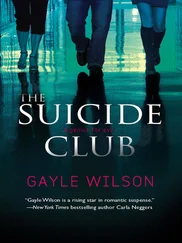“Who’s talking?” Elsa said. “Is that Ernest?” She was staring to her left, just below the window at the dark screen. “What’s that he said? That’s not Ernest. There’s a man there. Make him stop. Make him go away.”
Claire moved to the record player and replaced the needle. She turned on the small lamp beside it. “Did it stop?” she asked.
Elsa’s gaze froze on her. “You dirty devil! Dirty gay! Nazi!”
Claire walked across the room, opened the door to the side porch, and stepped out into the snow, shivering uncontrollably. The snow was everywhere. The snow was snow. It was her mother. It was the sea.
It was the disease talking, not Elsa. This was the mantra Michael taught her. It was the disease, not the person, that Claire was hurt by, angry at. Unless, of course, Elsa knew Claire better than ever now; unless Elsa saw her as the devil for keeping her alive.
The snow rushed in as Claire closed the door. The house was a mad snow globe. Claire sat down on the couch, beside Elsa in her armchair. She touched Elsa’s arm, her rubbery skin. Her mother flinched. “I know it’s scary,” she said. Claire handed her the stack of towels to fold, and Elsa seemed to forget what frightened her.
Just one more thing to do.
The snow cover sparkled in the thaw, the microscopic mountains and valleys of its surface catching every movement of light. It grimaced and buckled with anticipation. Claire could never get used to the fantastic roar the thaw made, a great, unending yawn that accompanied the day. And there were other new sounds: at first she thought someone was breaking in, but it was only a falling icicle. The tips of old meadow grass began to show, and the low stone wall along the property line. A buried bucket appeared, dirty and swollen-looking; it had been there all along. Soon they would see the ground.
Rain coming down in beats. Long fingers of rain shooting through the surface of the snow, leaving pockmarks among the wreckage of lawn chairs, reaching for the earth. Snow that had been the height of a man, that could have swallowed a man whole, so powerful and seemingly solid, could be erased by a little rain.
During these changes, Elsa rarely spoke, yet she seemed more at ease. So Claire felt not altogether horrible about taking her on a field trip.
They drove slowly up to the large iron gates, which did not open for them, padlocked and far too large to scale. She hadn’t planned on that. She hadn’t really thought it through at all.
She got back in the car and drove clockwise around the perimeter of the complex. It was utterly Gothic, with a few cement one-story additions that stuck out sorely. Stone walls and spires beyond, like great, gnarled fingers jutting up from the earth.
Toward the back of the hospital, there was another, lower stone ledge that looked in ruins, police tape draped haphazardly. She drove past this and parked some twenty feet from the broken wall.
“I’ll be back soon,” she said. “I’m going for a look around.” Elsa only smiled. Claire left her mother in the car, the doors locked and window rolled down a crack. Like a dog. But bringing her in seemed worse.
Stepping cautiously on the slushy, muddy grass in her thin flats — why hadn’t she worn more sensible shoes? — Claire noticed graffiti and imagined prowlers waiting for her, gangs of skinheads and escaped hospital inmates. She glanced back toward the car and her mother and, hiking up her slacks, stepped over the low wall.
The lawn was freshly manicured, which was peculiar. Upkeep had been part of the patients’ regimen, but there were no patients now. She passed the man-made lake to the left of the path, which she regained as if she’d walked in through the main gate, not like a thief through the side door. It was perfectly sunny in all Claire’s memories of the place, the weather never once reflecting the misery inside. But now it began to drizzle, covering everything equally; rain did not play favorites. The lake dimpled, and Claire walked swiftly toward the entrance.
The front doors were not old and grand like the walls around them. They were the double doors you’d find on a gymnasium, and they were unlocked, like someone had broken in ahead of her — her fears of prowlers again substantiated. Had she locked the car doors? She imagined inmates clawing at the car windows, their fingers scraping, her mother wide-eyed and alone. But Elsa was safe, she was fine, the doors were locked.
Inside resembled a sixties high school. The halls were yellowed like teeth. The linoleum floor was full of air pockets, years of dust in the seams. There was a sense of people having left in a rush, but there was something arbitrary about it, as if they hadn’t known why they hurried.
Claire held her breath. Every window was covered with fingerprints. Through them, the gray daylight seemed to swing away from her as she stepped farther in. Her footsteps, echoing, ran ahead of her. Down one hall, bed frames were scattered like bones. Sheets of plastic, shredded at the ends in big angry tears, were thrown over them.
On one visit, when she was a child, Claire had stood in the hall waiting for Elsa to finish talking, when Claire’s grandmother grabbed her by the wrist and led her into a room and said, with one finger over her lips, “Get under the bed or they’ll find you.” When she pushed Claire down and under, it was gentle, prompting. Claire did as she was told, concerned that it would be impolite to refuse. From under the bedframe, she saw her grandmother’s feet shuffle into the hallway. She heard her say, “I found my daughter. At last I found my daughter.”
Claire crawled out and dusted off her knees. “I’m not your daughter,” she said. In the doorway, her grandmother turned to her and let out a wail so wild and so sad, Claire began to cry.
The rain was coming down harder now. A wooden wheelchair sitting beside a door caught Claire’s eye. It seemed to be waiting for someone. In front of the chair were two parallel depressions in the floor, heel-shaped; someone had shuffled their feet for decades.
Her grandmother had been tied into one of those wheelchairs when she’d started singing and wouldn’t stop. Her wail had become a grotesque aria. But Claire had thought it was beautiful. The nurses tried to stop her. She was so loud. They put their sweaty hands over her mouth. They tied her down and wheeled her away and Claire could hear her voice ringing down the halls.
Through the door beside the wheelchair was a treatment room — just a tub and a reclining chair like at a dentist’s office. She’d heard the words “hydrotherapy” and “cold packs” on her visits. But she hadn’t known back then how the nurses would wrap her grandmother up in wet sheets, then submerge her in a tub full of ice.
The weather echoed. Rain pounded on loose windows. Claire walked into what appeared to be a gymnasium or theater or both, a small wooden stage at the front and rafters in the back. Handwriting was scribbled all over the walls, huge looping letters. Names. So many names.
The patients here hadn’t quietly given themselves over to institutional life. They hadn’t faded away. They came in with numbers on their sleeves and gave themselves new names. They organized and rallied, insisted on payment for their labor. Claire’s grandmother had sent her fair share of letters to the president of the hospital, demanding to be discharged. Every letter went unanswered. But it didn’t matter. Their numbers didn’t stick, and their names still covered these walls. Her grandmother had been part of this community.
Claire had once been resigned to the fact that she would one day go mad. Was she disappointed, as Nicolette had long ago suggested? Could the act of going mad be a form of rebellion? Her grandmother’s singing or poetry — was that defiance? There was a thin line between rebellion and resignation.
Читать дальше












